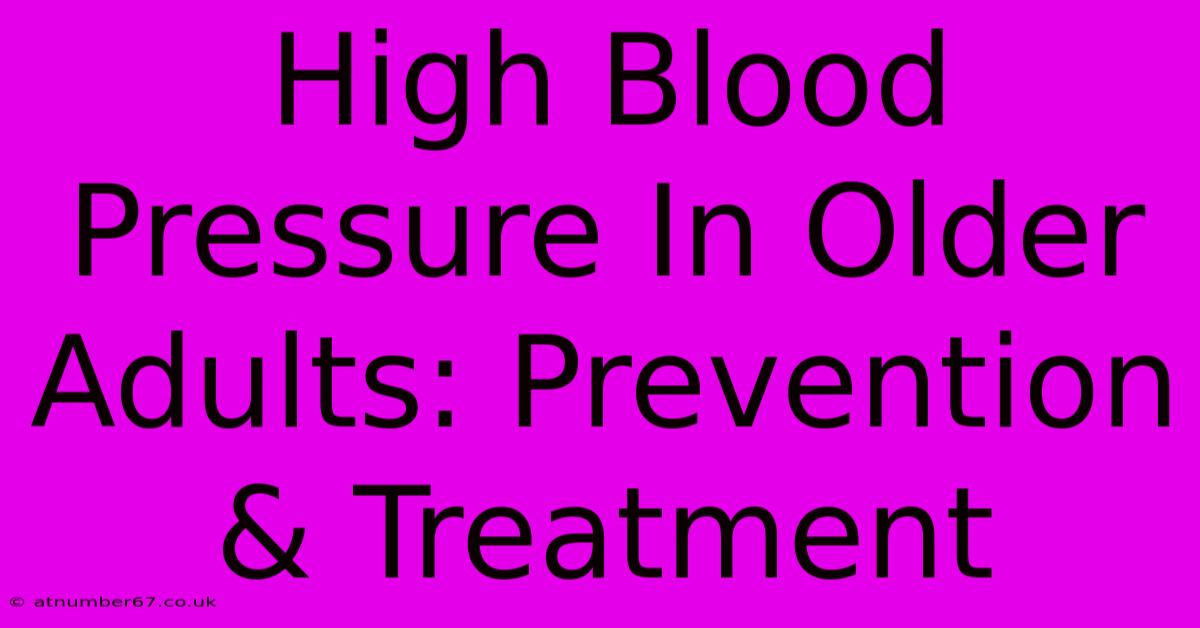High Blood Pressure In Older Adults: Prevention & Treatment

Table of Contents
High Blood Pressure in Older Adults: Prevention & Treatment
High blood pressure (hypertension) is a significant health concern, especially for older adults. Understanding the risks, prevention strategies, and available treatments is crucial for maintaining a healthy and fulfilling life as we age. This article delves into the specifics of hypertension in seniors, providing actionable information to help you or your loved ones manage this condition effectively.
Understanding Hypertension in Older Adults
Hypertension is diagnosed when blood pressure consistently reads 140/90 mmHg or higher. In older adults (typically 65 years and older), the definition might be slightly different, with some guidelines suggesting a threshold of 150/90 mmHg. This is because blood pressure naturally tends to increase with age. However, high blood pressure in older adults remains a serious condition, significantly increasing the risk of several life-threatening complications.
Why is Hypertension More Prevalent in Older Adults?
Several factors contribute to the higher incidence of hypertension among older adults:
- Stiffening of Arteries: With age, arteries become less elastic, making it harder for the heart to pump blood. This increased resistance leads to higher blood pressure.
- Decreased Kidney Function: The kidneys play a vital role in regulating blood pressure. Age-related decline in kidney function can impair this regulation.
- Increased Risk of Other Chronic Conditions: Older adults are more likely to have other conditions like diabetes, heart disease, and obesity, all of which can contribute to hypertension.
- Medication Side Effects: Some medications commonly used by older adults can increase blood pressure as a side effect.
Complications of Untreated Hypertension in Older Adults
Untreated or poorly managed high blood pressure in older adults significantly increases the risk of:
- Stroke: High blood pressure damages blood vessels in the brain, increasing the risk of stroke, a leading cause of disability and death.
- Heart Attack: Hypertension strains the heart, increasing the risk of heart attacks and heart failure.
- Kidney Disease: High blood pressure damages the kidneys, leading to chronic kidney disease.
- Dementia: Studies suggest a link between high blood pressure and an increased risk of developing dementia.
- Vision Loss: Hypertension can damage blood vessels in the eyes, leading to vision problems and blindness.
Preventing High Blood Pressure in Older Adults
While some factors contributing to hypertension are unavoidable due to aging, several lifestyle modifications can significantly reduce the risk:
Lifestyle Changes for Prevention
- Maintain a Healthy Diet: Focus on a diet rich in fruits, vegetables, whole grains, and lean protein. Limit sodium intake, as high sodium contributes to fluid retention and increased blood pressure. The DASH diet (Dietary Approaches to Stop Hypertension) is specifically designed to help lower blood pressure.
- Regular Exercise: Aim for at least 150 minutes of moderate-intensity aerobic exercise per week. This helps maintain a healthy weight and improves cardiovascular health.
- Maintain a Healthy Weight: Obesity is a major risk factor for hypertension. Losing even a small amount of weight can significantly lower blood pressure.
- Limit Alcohol Consumption: Excessive alcohol intake can raise blood pressure. Moderation is key.
- Quit Smoking: Smoking damages blood vessels and increases blood pressure. Quitting is one of the best things you can do for your overall health.
- Manage Stress: Chronic stress can contribute to high blood pressure. Finding healthy ways to manage stress, such as meditation or yoga, is beneficial.
Treating High Blood Pressure in Older Adults
Treatment for hypertension in older adults typically involves a combination of lifestyle modifications and medication.
Medication for Hypertension
Several medications are available to treat high blood pressure, including:
- Diuretics: These medications help the body eliminate excess sodium and water, reducing blood volume and blood pressure.
- ACE Inhibitors: These medications block the production of a hormone that narrows blood vessels.
- Angiotensin Receptor Blockers (ARBs): Similar to ACE inhibitors, ARBs block the action of angiotensin, relaxing blood vessels.
- Beta-Blockers: These medications slow the heart rate and relax blood vessels.
- Calcium Channel Blockers: These medications relax blood vessels and lower heart rate.
It's crucial to consult with a doctor to determine the appropriate medication and dosage. Older adults may require different dosages or combinations of medications compared to younger individuals. Regular monitoring of blood pressure is essential to ensure the effectiveness of treatment.
Conclusion
High blood pressure is a serious concern for older adults, but with proactive prevention strategies and appropriate treatment, its impact can be significantly minimized. By adopting a healthy lifestyle, and working closely with a healthcare provider, older adults can manage their blood pressure and enjoy a healthier, longer life. Remember, early detection and consistent management are key to preventing serious complications associated with hypertension. Don't hesitate to consult your doctor if you have concerns about your blood pressure or the blood pressure of an aging loved one.

Thank you for visiting our website wich cover about High Blood Pressure In Older Adults: Prevention & Treatment. We hope the information provided has been useful to you. Feel free to contact us if you have any questions or need further assistance. See you next time and dont miss to bookmark.
Featured Posts
-
Hailey Biebers Real Age Revealed Prepare To Be Shocked
Apr 04, 2025
-
Charles Oakley From Roughneck To Rich Man
Apr 04, 2025
-
Bugoy Carino His Age And The Power Of Persistence
Apr 04, 2025
-
Elizabeth Hurley S Son The Power Of Positivity
Apr 04, 2025
-
Adam Sandlers 2025 Net Worth Beyond Your Wildest Dreams
Apr 04, 2025
